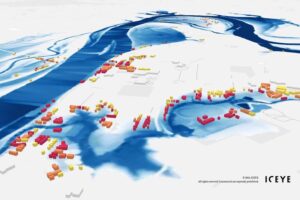Iceye establishes U.S. headquarters and manufacturing facility in Irvine, California
By Debra Werner

SAN FRANCISCO – Iceye has established a satellite manufacturing facility, research and development laboratory, and mission operations center for U.S.-licensed spacecraft at its new Iceye U.S. headquarters in Irvine, California.
“A huge part of our nation’s space industrial base and centers for innovation are located here in Southern California,” Jerry Welsh, Iceye U.S. CEO told SpaceNews. “In addition, there’s an amazing pool of talent and we have tight collaboration with some of the other space companies in the area.”
Finland-based Iceye established Iceye U.S. in early 2020. The company announced plans April 15 to expand its U.S. organization in response to rising government and commercial demand for synthetic aperture radar (SAR) imagery and data, Welsh said.
“U.S. customers, particularly U.S. government customers, have a preference towards working with U.S. entities,” Welsh said. “There are also certain security operations that make it much easier to work here,” Welsh said from his Irvine office.
Iceye also announced an agreement April 15 with In-Q-Tel, the U.S. intelligence community’s nonprofit investment organization.
“Iceye’s world-class SAR satellites and their market-leading global coverage allows for [imagery] capture despite time of day and weather conditions,” Simon Davidson, In-Q-Tel managing partner, said in a statement.
Iceye is not disclosing the value of In-Q-Tel’s investment but Welsh called it “important validation of what the company is doing.” In-Q-Tel offers “a means to connecting our technology to new U.S. government customers,” Welsh added.
Iceye is preparing to launch 10 satellites this year, after launching four in 2019. The company has six satellites in orbit providing government and commercial customers with SAR data and imagery.
Recent commercial orders include data related to commodities trading and environmental security, Welsh said.
Meanwhile, Iceye is continuing to attract government customers.
In January, a U.S. government official contacted Iceye on a Friday night to request imagery of a coastal oil spill. Iceye was able to task a satellite to obtain the imagery at night, which it delivered to the customer early Saturday morning.
“That image clearly showed the location of the oil spill and it was so specific that they were able to estimate the thickness of the oil based on the image,” Welsh said.
April 15, 2021 at 05:30PM
via SpaceNews read more...

Post a Comment